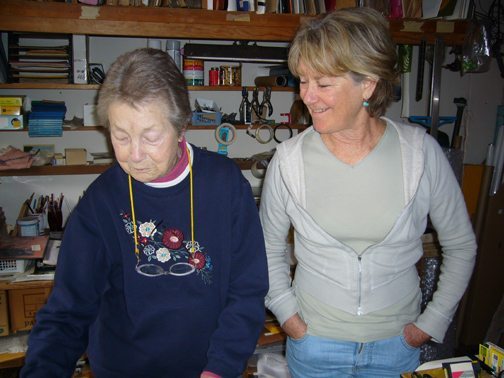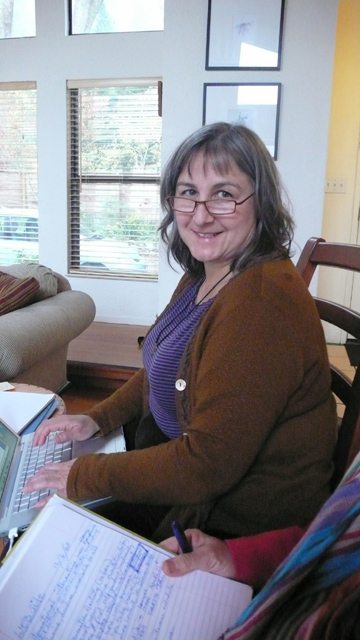Welcome to our first issue. It took three years to think about, design, and create this website. With luck, the next issue will come easier and faster.
BUILDING COMMUNITIES
After 15 years of publishing the artists’ Directory, we’re pushing edges to publish exclusively online, adding news, essays, reviews and insights of eco and social issue artists and projects.
Going paperless and instituting interactive artist listings (this is the plan) should free our Board’s stretched-thin time to enable producing more creative, activist collaborations—more eco-educational outreach programs, events and exhibits, and especially, WEAD’s Magazine.
PAST IS PROLOG
As synchronicity would have it, before we were artists, co-founder Jo Hanson and I both had degrees in Journalism. It didn’t seem important when we first met in 1988 introduced by Suzanne Lacy (seen above right with Jo in Jo’s San Francisco studio, 2006). In 1988 I was assisting Suzanne on her community-centered Oakland project, “City Sites,” which, with others, featured ecoartists Helen and Newton Harrison, and Mierle Laderman Ukeles–self-made NYC Sanitation Department Artist in Residence. Jo ‘borrowed’ Mierle for a company meeting to support her proposal for a San Francisco ‘dump’ artist residency (now celebrating 20 years and renamed Recology). As an early dump artist, I was privileged to be supported to create my first large-scale community based work.
The above is not an exercise in name-dropping. I am illustrating WEAD’s core thinking: networking—sharing knowledge and support—is a feminist activist strategy. Spreading knowledge does not thin it out; it strengthens it.
In 1995 Jo, Estelle Akamine (another early Recology artist) and I started WEAD with this concept: make connections, build a web. We employed historically sound political organizing techniques to connect artists with writers, curators, and city administrators; to share strategies and information. Armed with strategy and precedents, socially engaged artists can make more projects. We ourselves were a successful product of that principle.
Over the years Jo and I collaboratively wrote and edited many articles and project proposals beyond WEAD. While we might arm wrestle over syntax and spelling, we collectively shared visions for expanding WEAD’s reportage and connecting an international ecofeminist community. We shared another concept — beyond pro-active networking, it is critical to inspire, as well as inform.
Jo died in March 2007. WEAD is built upon her tenacious spirit. We aspire to publish the pragmatic and the poetic.
SEED & LEGACY ARTISTS
This issue introduces two new Directory components: ‘Seed Artists’ and ‘Legacy Artists.’ A Seed Artist has worked in the field for twenty plus years, creating significant projects with environmental and/or social justice intent. Legacy Artists are Seed Artists who have died, but whose work continues to influence the present and the future. We’ve barely begun building these sections, so we ask your help. Please send us names of artists to nominate for either section.
MOVING FORWARD
As Jo would understand and concur, this issue is not dedicated to her. It is dedicated to those committed, creative feminists working with environmental and/or social justice issues whose work is yet to be realized and recognized.
The craziness and the joy of this work is that you often do not see the end product, but are hooked to the process. Intuitively we believe that by introducing one artist to many, and many to many more; by connecting work to work, project to project; by passing on information on ecofeminist art strategies that help to clean a river, build a community garden, clean the air, and eliminate pesticides, while concurrently washing the daily dishes, we share hope in a safer, cleaner, healthier future. We are certain that somewhere, someone, far down the line, will collaboratively do something absolutely fabulous. Still, while hopeful we remain pragmatic. Still, someone must keep at the mundane daily work that sparks the process and shares respect for life. Here we go again.
THANK YOU
Thank you to the writers who generously allow us to publish their work here: Navjot Atlaf, Suzaan Boettger, Beth Carruthers, Beverly Naidus, Aviva Rahmani, Shelley Sacks, Sharon Siskin, and Shai Zakai.
Thank you to board member Judith Blankman (in the right-hand photo) who designed the first website in 1999, kept it going single-handedly for some 10 years, had the brilliant foresight to know ‘this was the way to go,’ and then gave more than a year of her life to help design our new site. We are in her debt, and love her!
PUBLISHING OPPORTUNITIES
WEAD welcomes unsolicited articles on any issue relevant to our extended communities. We seek to be inclusive and broad-based. We welcome articles that incorporate interdisciplinary and activist art concepts and issues. An important goal is to be more international in reach, eschewing American-centricity; so welcome and encourage articles from all types of communities, worldwide. We welcome proposals to edit an entire issue on a single subject matter. We pay a TBD honorarium for all published work
With luck and funding, WEAD will publish twice a year–Spring (April) and Fall (October).
Send all proposals, corrections, and/or inquiries to: weadartists@gmail.com
WEAD MAGAZINE ISSUE No. 1, CREATING CONNECTIONS
Published August 2010


